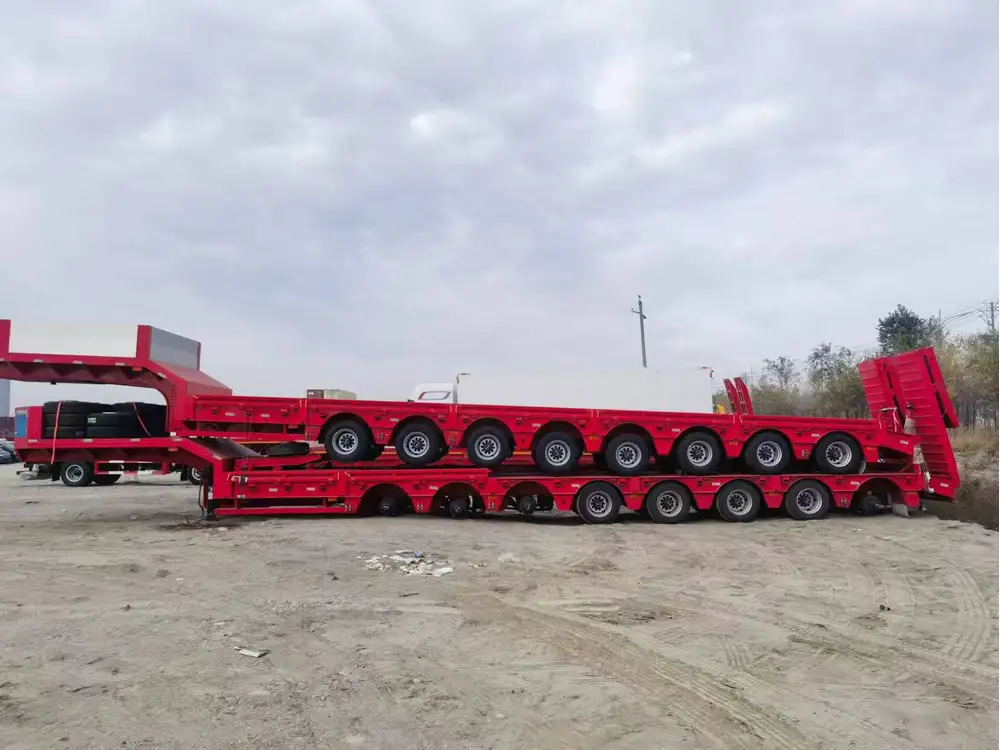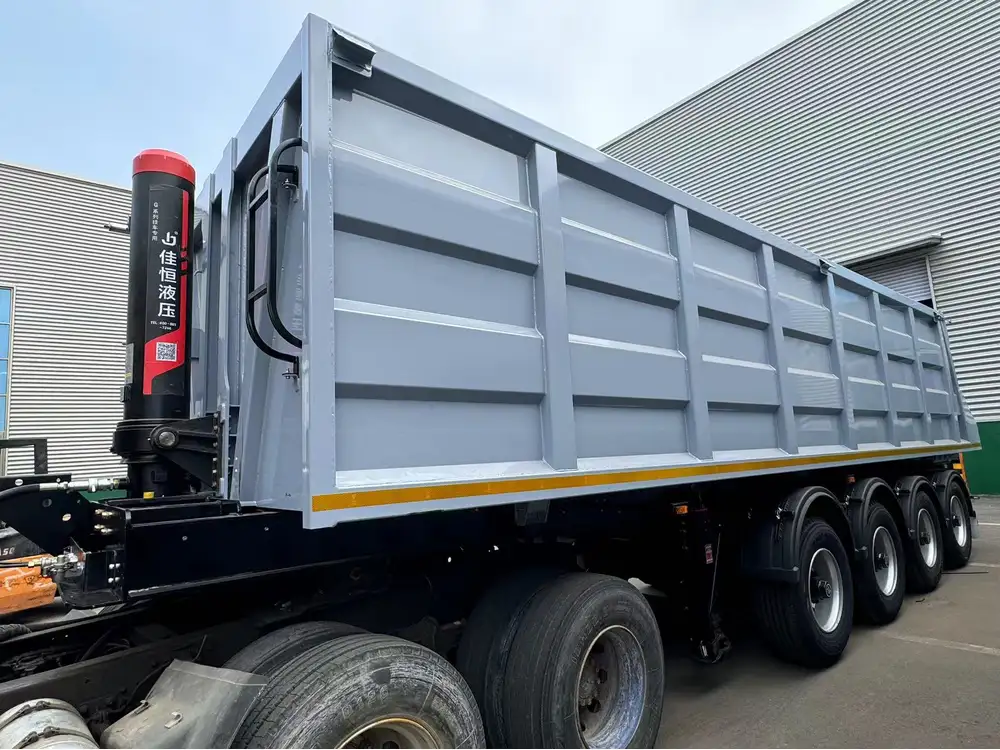When it comes to the effective operation of your dump trailer, selecting the appropriate hydraulic fluid is paramount. Hydraulic systems are designed to handle heavy loads and provide power to operate the dump mechanism. The right fluid not only enhances efficiency but also influences the longevity of the trailer’s components. In this guide, we dissect the essentials of hydraulic fluids, including types, specifications, and practical considerations to keep your dump trailer running smoothly.
Understanding Hydraulic Fluids
Hydraulic fluids transmit power and facilitate the smooth operation of hydraulic systems. In dump trailers, these fluids play a crucial role in lifting and lowering loads safely and efficiently. The type of fluid you choose impacts various factors, including:
- Performance: Efficiency in hydraulic pressure generation.
- Temperature Management: The ability to operate in varying environmental conditions.
- Wear Protection: Minimizing wear and tear on hydraulic components.
Properties of Hydraulic Fluids
Hydraulic fluids should possess certain key properties to ensure optimal system performance:
| Property | Description |
|---|---|
| Viscosity | The fluid’s resistance to flow; affects pump operation. |
| Lubrication | Ability to reduce friction between moving parts. |
| Compressibility | Minimal under pressure; ensures consistent operation. |
| Thermal Stability | Ability to maintain performance across temperature ranges. |
| Compatibility | Non-corrosive and compatible with system materials. |
Choosing a hydraulic fluid based solely on general recommendations can lead to compatibility issues, inefficiencies, and potential damage to the system over time.

Types of Hydraulic Fluids
Various hydraulic fluids are available in the market, each with specific formulations suited for different applications. Here, we break down the most common types:
1. Mineral Oil-Based Fluids
These are the most widely used hydraulic fluids and are derived from refined petroleum products. They offer excellent lubrication and wear protection. However, their performance can degrade under extreme conditions.
Pros:
- Good lubrication properties.
- Cost-effective for general use.
Cons:
- Sensitive to temperature fluctuations.
- Environmental concerns due to disposal.
2. Water-Based Fluids
These are either water-glycol or water-oil emulsions and are frequently used in applications where fire hazards are a concern. They offer lower viscosity and can withstand higher temperatures.
Pros:
- Fire-resistant, which adds safety.
- Lower cost compared to oil-based fluids.
Cons:
- Limited lubrication capabilities compared to oil-based fluids.
- Corrosion issues can arise if not properly maintained.

3. Biodegradable Fluids
With increasing environmental awareness, biodegradable hydraulic fluids have gained popularity. These are usually derived from renewable resources and offer similar properties to mineral oils.
Pros:
- Environmentally friendly.
- Sustainable sourcing.
Cons:
- Typically more expensive.
- May require more frequent changes.
4. Specialty Fluids
Certain applications may require fluids designed for extreme conditions, including high pressure or temperature scenarios. These fluids often contain additives to enhance specific properties.
Pros:
- Tailored for specific applications.
- Improved performance in extreme conditions.
Cons:
- Higher cost.
- More complex to select and manage.
Factors to Consider When Choosing Hydraulic Fluid
Selecting the right hydraulic fluid for your dump trailer involves careful consideration of several factors:

1. Operating Environment
Temperature extremes, humidity, and potential contamination can all affect hydraulic fluid performance. Consider where your dump trailer will operate most frequently:
- Cold Weather: A fluid with a lower pour point will perform better in freezing temperatures.
- Heat: Select fluids with higher thermal stability for operations in hot climates.
2. Load Weight and Frequency of Use
Heavy loads require fluids that can handle increased pressure without breaking down. Frequent usage also necessitates fluids that retain their properties over time.
3. System Compatibility
Ensure that the fluid you choose is compatible with your system’s materials (hoses, seals, etc.) to prevent degradation and leakage. Always consult the manufacturer’s guidelines or fluid compatibility charts.

4. Maintenance and Frequency of Changes
Regular maintenance is essential for hydraulic systems. Understand the life expectancy of your chosen fluid and how often it needs to be replaced to ensure optimal performance.
5. Cost Considerations
While premium fluids offer superior performance, it’s crucial to balance quality with budget constraints. Analyze the long-term costs, including maintenance and performance, rather than just the initial price.
Common Questions About Hydraulic Fluids

What Are the Signs That It’s Time to Change the Hydraulic Fluid?
Periodically inspect your hydraulic fluid for the following indicators:
- Contamination: Visible debris or discoloration.
- Foaming or Aeration: Presence of bubbles which could affect performance.
- Odor: Unusual smells could indicate thermal breakdown.
- Viscosity Changes: A significant drop in viscosity noted through pump noise or operation inefficiencies.
Can I Mix Different Types of Hydraulic Fluids?
Mixing different types of hydraulic fluids is generally discouraged due to potential chemical reactions and performance issues. It can lead to decreased efficacy and increased wear on the hydraulic components. Always adhere to the manufacturer’s specifications.
How Do I Properly Dispose of Used Hydraulic Fluids?
Adhere to local regulations regarding the disposal of hazardous materials. Many automotive shops and waste management companies offer fluid recycling services. Never pour hydraulic fluid down drains or dispose of it with regular trash.

What Should I Do If I Suspect Contamination?
If contamination is suspected, immediately stop trailer operation and inspect the system. Measure fluid clarity and check for foreign particles. Depending on the severity, you may need to flush the system and replace the fluid entirely.
Summary: Making Your Sump Trailer Work for You
When it comes to ensuring the peak performance of your dump trailer, selecting the right hydraulic fluid is crucial for seamless operation and longevity of your equipment. With a plethora of options available, you must consider operating environments, system compatibility, and maintenance needs to make an informed decision.
Comparison Table of Hydraulic Fluids
| Fluid Type | Pros | Cons | Best For |
|---|---|---|---|
| Mineral Oil-Based | Good lubrication, cost-effective | Temperature sensitivity, environmental concerns | General use |
| Water-Based | Fire-resistant, lower cost | Limited lubrication, corrosion concerns | High-fire risk environments |
| Biodegradable | Environmentally friendly, sustainable | Higher cost, frequent change requirements | Eco-conscious users |
| Specialty | Tailored performance | Higher cost, complexity | Extreme operating conditions |

Final Recommendations for Hydraulic Fluid Selection
- Regularly monitor your trailer’s hydraulic system for signs of fluid degradation.
- Consult with your trailer manufacturer for the most suitable fluid recommendation based on your specific model and usage.
- Invest in high-quality fluids to enhance performance and reduce maintenance costs in the long run.
In summary, a thorough understanding of hydraulic fluids will empower you to make the best choices for your dump trailer, ensuring it remains reliable and efficient for years to come.



